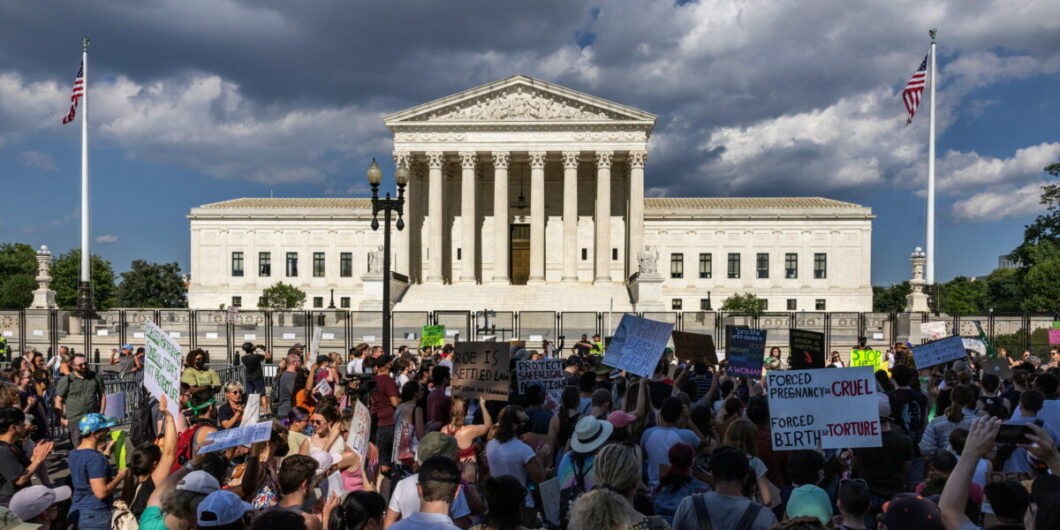Since the boundaries of left and right are always changing, a court focused on retaining its political capital would have the constancy of a weather vane.
What Tocqueville Saw in the Courts
Alexis de Tocqueville was a lawyer. Although by all accounts he was not a courtroom star, his brief legal career (he spent 4 years as the equivalent of an assistant public prosecutor) left a strong mark on him. Wherever he travelled, and whatever he wrote, he paid considerable attention to the judicial system. In the American case, Tocqueville studied the text of the Constitution, was a close reader of the Federalist Papers, spoke with Joseph Story and James Kent, perhaps the greatest American jurists of their time, and read their legal and constitutional commentaries. He attended trials and discussed the legal system with many American lawyers. Partly this was a result of his ostensible mission in the United States, to study the American penal system, but mostly it was because of his abiding interest in the law. Tocqueville’s discussion of the American judicial system, and in particular the role played by the constitutional review of legislation, is hardly unknown, but it is rarely a focus of discussion. This is unfortunate because it is insightful and very timely.
Tocqueville greatly admired the American Constitution. He wrote of the Philadelphia Convention of 1787: “If ever America was capable of rising for a few moments to the high level of glory that the proud imagination of its inhabitants would like constantly to show us, it was at this supreme moment.” The constitutional convention included, according to Tocqueville, “the best minds and most noble characters that had ever appeared in the New World.” But if he admired the Constitution, and regarded favorably the unique judicial system it created, he was also very aware of certain potential flaws, flaws whose importance has grown over time.
The way the Americans had chosen to structure their court system was unique, according to Tocqueville. While judges interpreted the law everywhere, only in America could judges choose “to base their decisions on the constitution rather than on the laws” (emphasis original). In other words, they had the authority to rule laws unconstitutional. In Tocqueville’s time, American judges were unique in having this power, and even today they exercise it far more commonly than elsewhere. The result was (and still is) that “there is hardly any political question in the United States that sooner or later does not turn into a judicial question.” In no other country was the judiciary as politically important as in America. It is interesting that one possible exception to this rule today is the Court of Justice of the European Union (CJEU), with the conspicuous political difference that its role flies under the radar screen of the average European, unlike the Supreme Court in America. Could the great importance of the judiciary be a characteristic of modern federal systems of government?
For Tocqueville, American courts’ political function was very important for preserving freedom: “The power granted to American courts to rule on the unconstitutionality of laws still forms one of the most powerful barriers that has ever been raised against the tyranny of political assemblies.” Or, as he put it elsewhere, “the judicial power in the United States is a barrier raised by design against the omnipotence of the majority.” One of the main purposes of constitutional review was to protect minorities against majorities.
Tocqueville perhaps had a particular minority in mind, one that today is not usually at the forefront of those with whom the left or even the right are chiefly concerned. “The real advantage of democratic government is not to guarantee the interests of all, as has sometimes been claimed, but only to protect those of the [majority]. In the United States, where the poor man governs, the rich have always to fear that he will abuse his power against them.” The implication, not stated by Tocqueville, is that an important function of the judiciary is to protect the rich from being robbed by the poor.
A court with the power of constitutional review has immense power. “When, after examining the organization of the Supreme Court in detail, you come to consider all of the attributions that it has been given, you easily discover that never has a more immense judicial power been constituted among any people.” To prevent abuse, that power must be subject to democratic checks and balances. Outside the United States, such checks on judicial power did not exist. In Tocqueville’s time, the French constitution lacked them because its constitution could not be amended. Without such checks and balances, “the constituent power would actually be in [the courts’] hands, since they alone would have the right to interpret a constitution whose terms no one could change. They would therefore take the place of the nation and dominate society.”
Tocqueville understood how constitutional review could enable judicial despotism. He envisaged two ways to counter it: by the democratic election of judges; or by creating a process of constitutional amendment. He gave short shrift to the first. On his voyage to America, Tocqueville was shocked to discover that several states had an elective judiciary. He thought it abominable: “I dare to predict sooner or later these innovations will have harmful results and that one day you will see that by diminishing the independence of the magistrates in this way you have attacked not only the judicial power but also the democratic republic itself.” He rejected the “secret tendency” in the United States that “leads the people to reduce the judicial power” in this way. If one purpose of the courts was to resist the tyranny of the majority, electing their members seemed like a bad idea. Tocqueville was even suspicious of the ability of state legislatures to impeach.
The only good way to limit the potential for judicial despotism was, therefore, the amendment process. This was plausible in Tocqueville’s time. He published the first volume of Democracy in America in 1835, when he had before him the precedents of the first ten amendments, which followed closely on the ratification process. Perhaps still more importantly in this context, the 11th amendment had been passed in 1795 to reverse a Supreme Court judgment of 1793 (Chisholm vs. Georgia), and there was also the 12th amendment, passed in 1804 to remedy the flaws in the process of electing the president revealed by the election of 1800. Constitutional change did not seem insuperable. This was still true later in American history. When the Supreme Court rejected the power of the federal government to levy an income tax in 1895, an amendment overturning this decision was passed in 1909 and ratified in 1913—still fairly quick work (I am deliberately overlooking the post-Civil War amendments). That was the last time the amendment process was used to overturn a Supreme Court decision. Nevertheless, the amendment process was used with relative frequency thereafter—ten times through 1971.
For the sake of their own democratic agendas, today’s left and right might agree to preserve, strengthen, and restrain the Court by a timely revision of the amendment process.
But for the past 50 years, the amendment process has proved a largely insuperable barrier to change. The last significant amendment was the 26th, passed in 1971, giving the right to vote to those over 18. Overlooking the trivial 27th amendment, passed in 1992 after waiting in the wings for 202 years, there has been nothing since. By comparison, recent European constitutions do not have this problem. The German Federal Constitution of 1949 has been amended 62 times. Even the EU Treaties, which effectively serve as the EU constitution, have been amended more often (four times since 1958).
What then remains of Tocqueville’s democratic check on the despotism of the Supreme Court? Little or nothing.
The late Justice Scalia recognized this problem. In 2014, Scalia and Justice Ginsburg were interviewed before the National Press Club. They were each asked if they could change one thing about the American constitution, what would it be? Predictably, Ginsburg added the Equal Rights Amendment. Scalia’s answer was much more thoughtful. He said that he would make it easier to change the constitution. In his view, changing the constitution ought to be hard, but not as hard as it is. He had once calculated that 2% of the population of the United States, by electing a majority of the legislature in 1/4 of the smallest-population states, could block an amendment. This was unacceptable.
Scalia did not, however, suggest how the amendment process should be improved. Today, amending the Constitution requires a 2/3 majority of the House and Senate and ratification by 3/4 of the states. Let me suggest a change that I think would fulfill both Scalia’s and Tocqueville’s desires. It should be possible to amend the constitution by a 60% vote of the House and Senate, ratified by at least 60% of the States, provided that those states contain at least 65% of the American population according to the most recent Census. I leave for further debate the question of whether state ratification should be by the legislature or by popular referendum. In either case, a simple majority vote should suffice.
In the absence of a workable amendment process, the power of the Supreme Court lacks the democratic check that Tocqueville thought necessary to prevent judicial despotism (or the judicial endorsement of executive despotism). Without such a democratic check, Tocqueville concluded that “as for me, I would never advise any people to leave to the courts the care of guaranteeing its liberty. I would be afraid that the courts would sacrifice it to the [executive] or to themselves.”
In this situation, Tocqueville’s advice for the Justices of the Supreme Court takes on additional importance: “Their power is immense; but it is a power of opinion. They are omnipotent as long as the people consent to obey the law; they can do nothing once the people scorn the law. Now, the power of opinion is the most difficult one to exercise, because it is impossible to know its limits exactly. Often it is as dangerous to fall short, as to go beyond those limits.” Therefore Supreme Court justices, besides being good legists, “must also be statesmen; they must know how to discern the spirit of the times, to brave the obstacles that can be overcome, and to change direction when the current threatens to carry away, with them, the sovereignty of the Union and the obedience due its laws. … If imprudent or corrupt men ever came to compose the Supreme Court, the confederation would have to fear anarchy or civil war.”
This is what happened in 1857 when the Dred Scott decision sanctified slavery and helped bring about the Civil War. Justices need to be statesmen aware of public opinion, or they will court disaster—as the imprudent justices of the past several decades have been doing. This is not to say that Tocqueville thought judicial decisions should be based on opinion polls. Opinion polls didn’t exist in his day, and more fundamentally, it would be impossible for courts to protect minorities against the majority if they simply followed the majority’s will. Nevertheless, judicial statesmanship requires attention to the real limits on the Court’s power, and on the power of the law, imposed by opinion.
Since we cannot, alas, guarantee that Justices will be statesmen, we must be able to fix their mistakes. Perhaps, for the sake of their own democratic agendas, today’s left and right might agree to preserve, strengthen, and restrain the Court by a timely revision of the amendment process.



